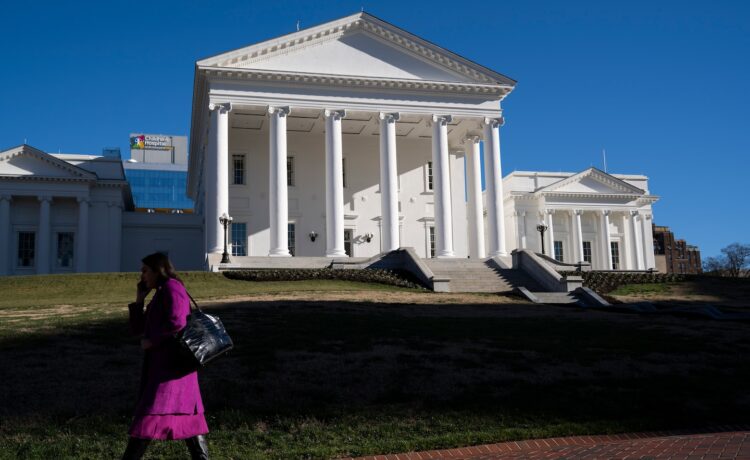The money committees of both chambers rolled out spending blueprints that torpedo most of Youngkin’s proposed tax cuts and use the money instead to beef up spending on schools, employee raises and other Democratic priorities.
The House and the Senate differ on many details, though, most starkly when it comes to the proposed $2 billion arena. Senate Finance and Appropriations Committee Chairwoman L. Louise Lucas (D-Portsmouth) followed through on threats to cut enabling language for the Potomac Yard project out of the budget, while the House included language that differs from Youngkin’s original proposal.
The House budget language incorporates an arena bill approved in that chamber last week, which would give the legislature greater control over the Sports and Entertainment Authority that would be set up to run the project, prioritize paying the state back for transportation costs and require legislative reenactment next year. Delegates say those and other provisions are aimed at safeguarding the state’s interests more strictly than Youngkin’s preferred approach would.
Lucas had announced her opposition to the arena last week, but her decision to strip Metro funding came as a surprise Sunday.
“I feel like Metro has not done a good job of managing their resources,” she told reporters after the meeting. “They need to get their act together … I decided not to put a dime in, and I know that makes 12 [Senate] members from Northern Virginia unhappy, but guess what? It’s a new day in the commonwealth.”
Lucas’s comments about Metro line up with criticism that Youngkin — someone she rarely agrees with — has made about the Washington Metropolitan Area Transportation Authority. WMATA said in December that it faces a $750 million budget shortfall and needs increased contributions from its regional members, which includes Maryland, the District and Virginia.
Until recently, Youngkin had been unwilling to increase Virginia’s contributions until the Metro system fixes what he views as inefficient operations. But in January, he made an unspecified commitment to boost Metro funding as leading Democrats argued that an increase would be a condition for supporting the arena project.
Lucas’s move against Metro is certain to draw fierce pushback from legislators in traffic-choked Northern Virginia.
Del. Paul E. Krizek (D-Fairfax), in presenting the WMATA funding proposal to the House Appropriations Committee, noted that “approximately 45 percent of the commonwealth’s tax revenues are derived from Northern Virginia. A healthy and successful WMATA system benefits Virginia as a whole. Just want to remind you.”
Members of the Senate committee did not debate the budget, which passed unanimously. But one of the members from Northern Virginia, Sen. Barbara A. Favola (D-Arlington), said after the meeting that she still held out hope for Metro funding.
“There’s a long road ahead of us with this budget, and this is the first step. I am looking forward to having Metro funding in the final budget,” she said.
All of these proposals are preliminary. Youngkin put forward a two-year state spending plan in December, and the House and the Senate are marking that up to their own preferences. Once each chamber acts this week on the budgets proposed by their committees, they swap. The actual state budget probably won’t be hammered out until the final hours of the legislative session, which is set to adjourn March 9 — but could drag out longer if the House and the Senate can’t agree on the spending plan.
After that, Youngkin can use his line-item veto, and the General Assembly will have to return to reconcile any changes.
“Today is just a start,” Youngkin said in a written statement Sunday after both committees had met. He added that “Virginians can’t afford another tax increase and, in fact, need additional tax relief,” and said that he is “confident that working together with the General Assembly we can continue the progress we’ve made in our first two years and move the Commonwealth forward together.”
But Sunday’s proposals suggest the scope of the challenge that lies ahead.
On the House side, the Appropriations Committee unanimously approved a budget that includes only one major tax change that Youngkin had proposed: expanding the sales and use tax to include digital products. “On this, the governor was correct,” House Appropriations Committee Chairman Luke E. Torian (D-Prince William) said in presenting the plan. “It makes no sense to pay sales tax when you buy a Blu-ray disc but don’t pay a tax when you download the same movie from a digital retailer.”
Otherwise, the committee scrapped Youngkin’s call for some $1.4 billion in tax cuts over the two-year period, such as a cut to personal income tax rates, and instead used that money for other priorities. Those include:
- Three percent pay raises in each of the two years for state employees and state-supported local employees.
- Raises of nearly 3.5 percent each of the next two years for public school teachers and an increase of $940 million over Youngkin’s proposed budget to support school divisions.
- An increase of $79.5 million over two years to pay for raising the state’s minimum wage, which would be authorized by separate legislation working its way through the Capitol.
- An increase of nearly $150 million in Virginia’s contribution to the Washington Metropolitan Area Transit Authority.
- Some $20 million in funding to help a Cannabis Control Authority set up a regulated market for marijuana, as enabled by legislation in both chambers.
On the Senate side, the committee took a similar approach on taxes — scrapping all of Youngkin’s tax changes except for extending the sales and use tax to include digital products. Some of the Senate’s priorities include:
- Giving teachers a 3 percent raise in each of the two years of the budget.
- Providing state employees with a 2.5 percent raise effective Sept. 30, and an additional 2.5 percent raise effective July 1, 2025.
- Investing $33 million to expand the Safer Communities Program, which increases aid to local police departments and supports programs for at-risk youths.














